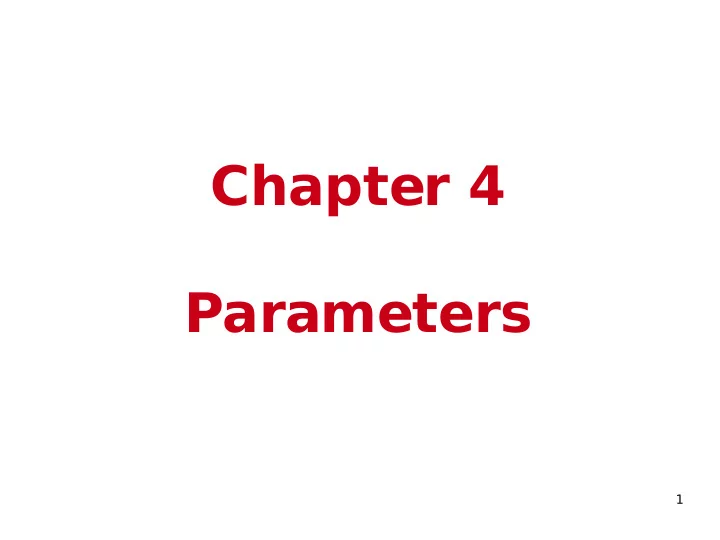

Chapter 4 Parameters 1
Parameters ● T wo methods of passing arguments to parameters ● Call-by-value – Also called Pass-by-value – “copy” of value is passed ● Call-by-reference – Also called Pass-by-reference – “address of” argument is passed – Cannot be used when passing literals 2
Call-by-Value Parameters ● Copy of actual argument passed ● Considered “local variable” inside function ● If modified, only “local copy” changes – Function has no access to “actual argument” from caller ● This is the default method – Used in all examples so far 3
4
Call-by-Value Example 5
Call-by-Reference ● Used to provide access to caller's actual argument ● Caller's data can be modified by called function ● T ypically used for input function – T o retrieve data for caller – Data is then “given” to caller ● Specified by ampersand, &, after type in parameter list e.g. int& x; 6
Call-by-Reference Example 7
8
Call-by-Reference Details ● What's really passed in? ● A “reference” back to caller's argument – Reference to memory location of argument – Called “memory address” – Unique number referring to a distinct place in memory 9
Constant Reference Parameters ● Reference arguments can be dangerous – Caller's data can be changed – Often this is desired, sometimes not ● T o protect data & still pass-by-reference – Use const keyword – No copy is made, only reference is passed – Argument is now read-only void displayData(const int& value1, const int& value2); 10
Mixed Parameter Lists ● Can combine passing mechanisms ● Parameter list can include – Pass-by-value – Pass-by-reference – Const pass-by reference ● Order of arguments in function call is critical – Pay attention to the order defined in the function header 11
Parameter Names ● Same rules as naming variables – Must be meaningful – Should reflect its use ● Functions are self-contained modules – Designed separately from rest of program – Parameter names can be same as argument names ● Function names should also be meaningful 12
Recommend
More recommend